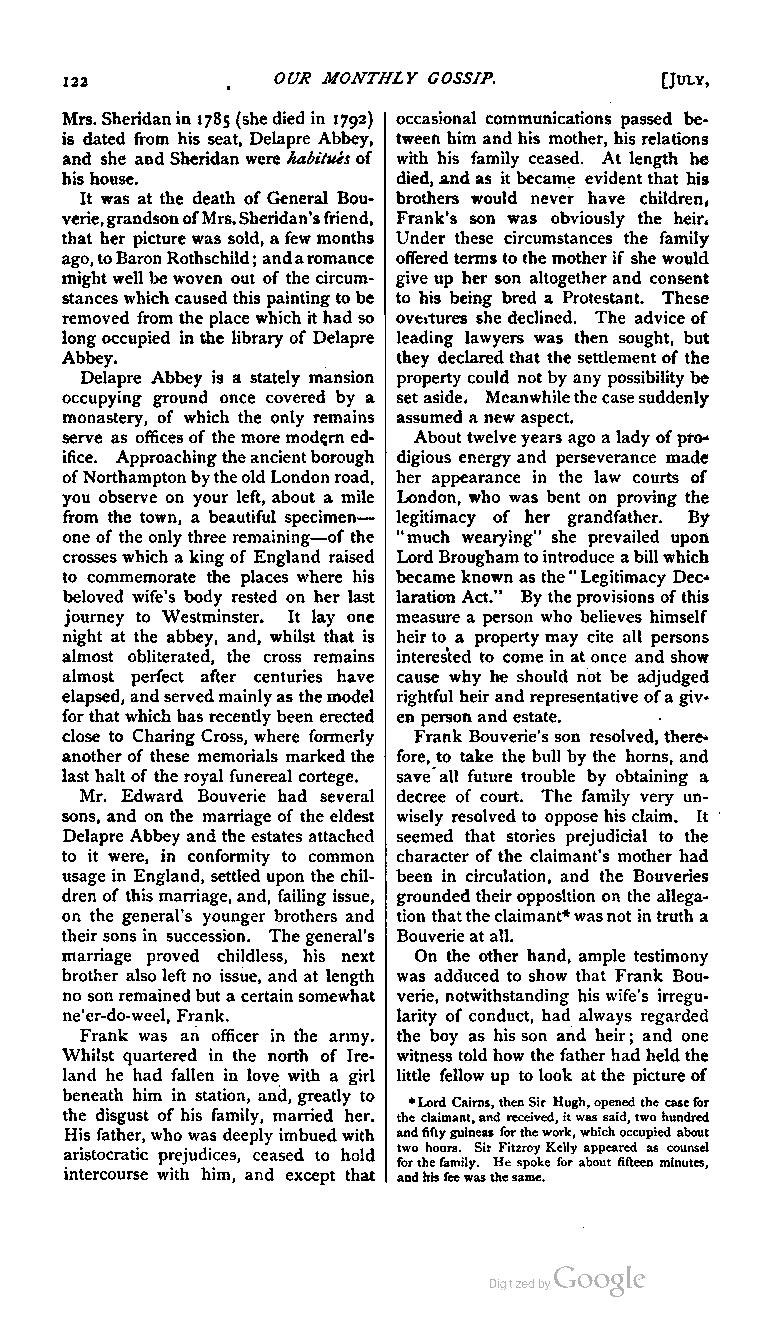Mrs. Sheridan in 1785 (she died in 1792) is dated from his seat, Delapre Abbey, and she and Sheridan were habitués of his house.
It was at the death of General Bouverie, grandson of Mrs. Sheridan's friend, that her picture was sold, a few months ago, to Baron Rothschild; and a romance might well be woven out of the circumstances which caused this painting to be removed from the place which it had so long occupied in the library of Delapre Abbey.
Delapre Abbey is a stately mansion occupying ground once covered by a monastery, of which the only remains serve as offices of the more modern edifice. Approaching the ancient borough of Northampton by the old London road, you observe on your left, about a mile from the town, a beautiful specimen—one of the only three remaining—of the crosses which a king of England raised to commemorate the places where his beloved wife's body rested on her last journey to Westminster. It lay one night at the abbey, and, whilst that is almost obliterated, the cross remains almost perfect after centuries have elapsed, and served mainly as the model for that which has recently been erected close to Charing Cross, where formerly another of these memorials marked the last halt of the royal funereal cortege.
Mr. Edward Bouverie had several sons, and on the marriage of the eldest Delapre Abbey and the estates attached to it were, in conformity to common usage in England, settled upon the children of this marriage, and, failing issue, on the general's younger brothers and their sons in succession. The general's marriage proved childless, his next brother also left no issue, and at length no son remained but a certain somewhat ne'er-do-weel, Frank.
Frank was an officer in the army. Whilst quartered in the north of Ireland he had fallen in love with a girl beneath him in station, and, greatly to the disgust of his family, married her. His father, who was deeply imbued with aristocratic prejudices, ceased to hold intercourse with him, and except that occasional communications passed between him and his mother, his relations with his family ceased. At length he died, and as it became evident that his brothers would never have children, Frank's son was obviously the heir. Under these circumstances the family offered terms to the mother if she would give up her son altogether and consent to his being bred a Protestant. These overtures she declined. The advice of leading lawyers was then sought, but they declared that the settlement of the property could not by any possibility be set aside. Meanwhile the case suddenly assumed a new aspect.
About twelve years ago a lady of prodigious energy and perseverance made her appearance in the law courts of London, who was bent on proving the legitimacy of her grandfather. By "much wearying" she prevailed upon Lord Brougham to introduce a bill which became known as the "Legitimacy Declaration Act." By the provisions of this measure a person who believes himself heir to a property may cite all persons interested to come in at once and show cause why he should not be adjudged rightful heir and representative of a given person and estate.
Frank Bouverie's son resolved, therefore, to take the bull by the horns, and save all future trouble by obtaining a decree of court. The family very unwisely resolved to oppose his claim. It seemed that stories prejudicial to the character of the claimant's mother had been in circulation, and the Bouveries grounded their opposition on the allegation that the claimant[1] was not in truth a Bouverie at all.
On the other hand, ample testimony was adduced to show that Frank Bouverie, notwithstanding his wife's irregularity of conduct, had always regarded the boy as his son and heir; and one witness told how the father had held the little fellow up to look at the picture of
- ↑ Lord Cairns, then Sir Hugh, opened the case for the claimant, and received, it was said, two hundred and fifty guineas for the work, which occupied about two hours. Sir Fitzroy Kelly appeared as counsel for the family. He spoke for about fifteen minutes, and his fee was the same.
